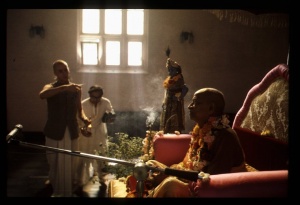SB 1.18.47 (1965)

A.C. Bhaktivedanta Swami Prabhupada
TEXT No. 47
- Apapesu swabhrityesu valena apakka buddhina
- Papam kritam tadbhagawan sarvatma kshantum arhati
ENGLISH SYNONYMS
Apapesu—unto one who is completely free from all sins, Swabhrityesu—unto one who is subordinate and deserves to be protected, Valena—by a child, Apakka—who is immature, Buddhina—by intelligence, Papam—sinful act, Kritam—has been done, Tadbhagwan—therefore the Personality of Godhead, Sarvatama—Who is all pervading, Kshantum—just to pardon, Arhasi—deserve.
TRANSLATION
The Rishi prayed for his son to the all pervading Personality of Godhead for pardoning his immature boy with no intelligence who committed the great sin of cursing a person who was completely free from all sins and being subordinate deserved to be protected.
PURPORT
Everyone is responsible for his own action either pious or sinful. The Rishi Samik could foresee it that his son had committed a great culpable act of sin by cursing Maharaj Parikshit who deserved to be protected by the Brahmins as he was a pious ruler as well as personally completely free from all sins on account of his becoming the first order devotee of the Lord. When offence is done unto the devotee of the Lord it is very difficult to overcome from the reaction of such offensive action. The Brahmins being on the head of the social orders they are meant for giving protection to the subordinates and not to curse them. Although there are occasions when a Brahmin furiously may curse the subordinate Kshatriya or the Vaishya etc but in the case of Maharaj Parikshit there was no ground for being cursed as it is already explained. But the foolish boy had done it out of sheer vanity of being a Brahmin's son and thus he became liable to be punished by the law of God. The Lord never forgives a person who condemns His pure devotee. Therfore the foolish boy of a Brahmin had not only committed sin by cursing a King but also he had committed the greatest offence by condemning a great devotee of the Lord. Therefore the Rishi could foresee that except the Supreme Personality of Godhead no other purificatory method could save his boy from great blunder of sinful act. He therefore directly prayed for being pardoned by the Supreme Lord who can only undo a thing which is impossible to be changed. The appeal was made in the name of a foolish boy who had developed no intelligence at all.
A question may be raised herein that it was the desire of the Lord that Parikshit Maharaj might be put into that awkward position so that he might be delivered from material existence then why a Brahmins son was made responsible for this offensive act. The answer is that the offensive act was made to be performed by a child only so that he could be excused very easily and thus the prayer of the father was accepted. But if the question is raised why the Brahmin community as a whole should be made responsible for allowing the Kali into the world affairs, the answer is given in the Varaha Puranam. It is said there that the demons who acted enimically with the Personality of Godhead but were not killed by the Lord were allowed to take birth in the families of the Brahmins taking advantage of the age of Kali. The all merciful Lord gave them chance to have their births in the families of the pious Brahmins so that they could further improve to get salvation but the demons instead of utilising the good opportunity misused the Brahminical culture on account of being puffed by vanity of becoming a Brahmin's son. The typical example is the son of Samik Rishi and all the foolish sons of Brahmin family are warned hereby not to become as foolish as Shringhee and be always on guard against the demoniac qualities which they had in their previous births. The foolish boy was of course excused by the Lord but for others who may not have a father like Samik Rishi will be put into great difficulty if they misuse the advantages obtained by the birth in a Brahmin family.